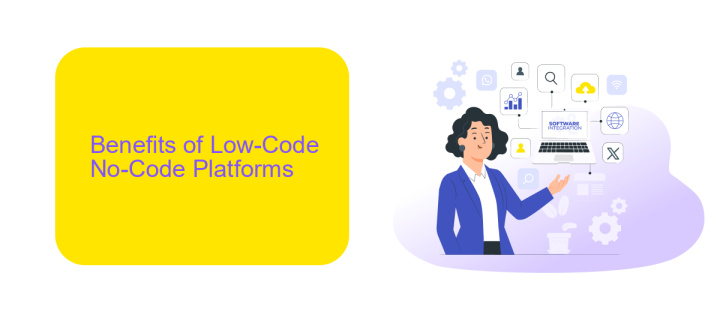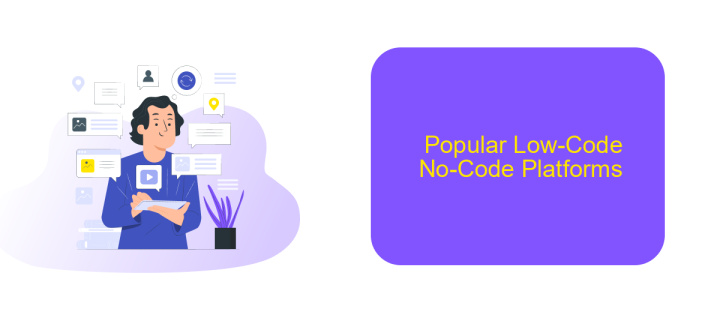Best Low-Code No-Code Platforms
In today's fast-paced digital landscape, businesses and individuals alike are seeking efficient ways to develop applications without extensive coding knowledge. Low-code and no-code platforms have emerged as powerful solutions, enabling rapid application development with minimal coding effort. This article explores the best low-code and no-code platforms available, highlighting their features, benefits, and how they can streamline your development process.
Introduction
The rise of low-code and no-code platforms has revolutionized the way businesses approach software development. These platforms empower individuals with little to no coding experience to create applications, automate workflows, and streamline processes. By reducing the dependency on traditional coding, organizations can save time and resources, enabling rapid digital transformation.
- Ease of use: Intuitive drag-and-drop interfaces make it accessible for non-developers.
- Cost-effective: Reduces the need for hiring specialized developers.
- Speed: Accelerates the development process, allowing for quicker deployment.
- Flexibility: Easily adaptable to changing business needs.
- Integration: Platforms like ApiX-Drive offer seamless integration with various services, enhancing functionality.
As businesses continue to seek efficient and scalable solutions, low-code and no-code platforms stand out as a game-changer. From small startups to large enterprises, the ability to quickly develop and deploy applications without extensive coding knowledge is invaluable. Whether you're looking to automate tasks or integrate different services, these platforms provide the tools necessary to stay competitive in today's fast-paced digital landscape.
Benefits of Low-Code No-Code Platforms

Low-code no-code platforms offer significant benefits, enabling businesses to accelerate their digital transformation without the need for extensive coding knowledge. These platforms empower non-technical users to create and deploy applications quickly, reducing development time and costs. By utilizing intuitive drag-and-drop interfaces and pre-built templates, companies can streamline their workflows, enhance productivity, and respond more swiftly to market demands.
Another major advantage is the ease of integrating various services and applications. Platforms like ApiX-Drive facilitate seamless integration, allowing users to connect different systems without writing complex code. This capability not only improves operational efficiency but also ensures that data flows smoothly across different departments and tools. As a result, businesses can achieve better data consistency, improved collaboration, and more informed decision-making processes.
Key Features and Capabilities

Low-code and no-code platforms offer a myriad of features and capabilities that empower both technical and non-technical users to create applications efficiently. These platforms are designed to streamline development processes, reduce time-to-market, and lower costs associated with software development.
- Drag-and-Drop Interface: Simplifies the design and development process by allowing users to visually assemble applications without writing code.
- Pre-built Templates and Components: Provides a library of templates and reusable components to accelerate development.
- Integration Capabilities: Seamless integration with third-party services and APIs, such as ApiX-Drive, to connect various applications and automate workflows.
- Scalability: Ensures that applications can grow and handle increased loads without significant rework.
- Security Features: Built-in security measures to protect data and ensure compliance with industry standards.
- Collaboration Tools: Facilitates teamwork by allowing multiple users to work on the same project simultaneously.
These key features make low-code and no-code platforms an ideal choice for businesses looking to innovate quickly and efficiently. By leveraging tools like ApiX-Drive for integrations, users can create robust applications that seamlessly connect with other systems, enhancing overall productivity and operational efficiency.
Popular Low-Code No-Code Platforms

Low-code and no-code platforms have revolutionized the way businesses approach software development. They enable users to create applications with minimal coding, reducing the time and cost associated with traditional development methods.
These platforms are designed to be user-friendly, making them accessible to both developers and non-developers. They offer a range of tools and features that simplify the development process, allowing users to focus on functionality and user experience.
- OutSystems: Known for its robust features and scalability.
- Mendix: Offers a comprehensive suite of tools for rapid application development.
- Appian: Focuses on business process management and automation.
- ApiX-Drive: Facilitates integration between various services and applications, enhancing workflow automation.
- Bubble: Ideal for building web applications without any coding knowledge.
These platforms have become essential tools for businesses looking to innovate quickly and efficiently. By leveraging low-code and no-code solutions, companies can streamline their development processes, integrate various services seamlessly, and bring their products to market faster.
Use Cases and Applications
Low-code and no-code platforms are revolutionizing various industries by enabling users to create applications with minimal coding knowledge. In the business sector, these platforms are used to develop customer relationship management (CRM) systems, automate workflows, and create custom dashboards for data visualization. They allow companies to quickly adapt to changing market demands and improve operational efficiency without the need for extensive IT resources.
In addition to business applications, low-code and no-code platforms are also employed in education, healthcare, and finance. For instance, educational institutions use these tools to build student management systems and e-learning platforms. Healthcare providers leverage them to create patient management systems and telemedicine applications. Furthermore, services like ApiX-Drive facilitate seamless integration between different software, enhancing the functionality of applications built on low-code and no-code platforms. This makes it easier to automate data transfer and synchronize information across various systems, thereby streamlining processes and reducing manual effort.
FAQ
What are low-code/no-code platforms?
Who can benefit from using low-code/no-code platforms?
What types of applications can be built with low-code/no-code platforms?
How secure are low-code/no-code platforms?
Can I integrate low-code/no-code applications with other software?
Routine tasks take a lot of time from employees? Do they burn out, do not have enough working day for the main duties and important things? Do you understand that the only way out of this situation in modern realities is automation? Try Apix-Drive for free and make sure that the online connector in 5 minutes of setting up integration will remove a significant part of the routine from your life and free up time for you and your employees.

